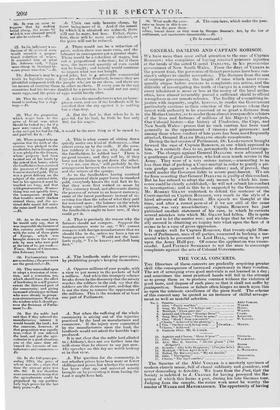GENERAL. DARLING AND CAPTAIN ROBISON.
WE have more than once called attention to the case of Captain Roinsox; who complains of having received grievous injustice at the hands of the noted Gmeral DARLING, in his proconsular government of New South Wales. From the days of VERRES. to the present time, the governors of distant provinces have been eon- stantiy subject to similar accusatimo;. The distance front the seat of supreme goverment, the length of time which must conse- quently elapse before answers to complaints can arrive, and the difficulty of investigating the truth of charges in a country where every inhabitant is more or less at the mercy of the local autho- rities, have almost invariably proved a sufficient shield to official wrongdoers in our remote colonies. The facility of committing in- justice with impunity, ought, however, to render the Government particularly cautious in their selection of the persons whom they invest with authority to be exercised at so great a distance from the Mother Country, as to render them almost irresponsible arbiters of the lives and fortunes of millions of his Majesty's subjects. Our Colonial history—the history of Hindostan, the Cape, and New South Wales—proves that no such caution has been used generally in the appointment ( f viceroys and governors : and among those whose conduct of late years has been most frequently attacked, General RALPH DARLING stands conspicuous.
During the last session of Parliament, Dr. LUsHINGTON brought forward the case of Captain ROBISON, as one which appeared to him, as it certainly does to us, peremptorily to demand investiga- tions. The charges against General DARLING were advanced by a gentleman of good character, who had seen much service its the Army. They were of a very serious nature,—amounting to no less than that of packing a Court-martial in order to gratify a pri- vate grudge against a subordinate officer; and, if proved, they would render the Governor liable to severe punishment. We are far from asserting that General DARLING is guilty of this conduct. But he has refused to adopt the only means by which his inno- cence could be clearly established,--he will not submit his conduct to investigation; and in this lie is supported by the Government. Mr. ROBERT GRANT undertook to defend the sentence of the Court martial on Captain ROBISON, very much in the style of a hired advocate of the General. His speech we thought at the time, and after a recent peru-al of it we are still- of the same opinion, was very unsatisfactory. Captain ROBISON has just published another statement of his case, in which he corrects several mistakes into which Mr. GRANT had fallen. Ile is quite right not to let the matter rest; and we hope that he will eventu- ally succeed in obtaining an inquiry into what upon the face of it seems to be a case of gross oppression.
It speaks well for Captain Rouss.ont, that twenty-eight.Mem- hers of Parliament, men of all parties, concurred in backing a me- morial which be presented to Lord HILL, requesting to be put upon the Army Half-pay. Of course the application was unsuc- cessful. Lord FITZROY SOMERSET is not the man to encourage complaints against the acts of Colonial Governments.
















 Previous page
Previous page